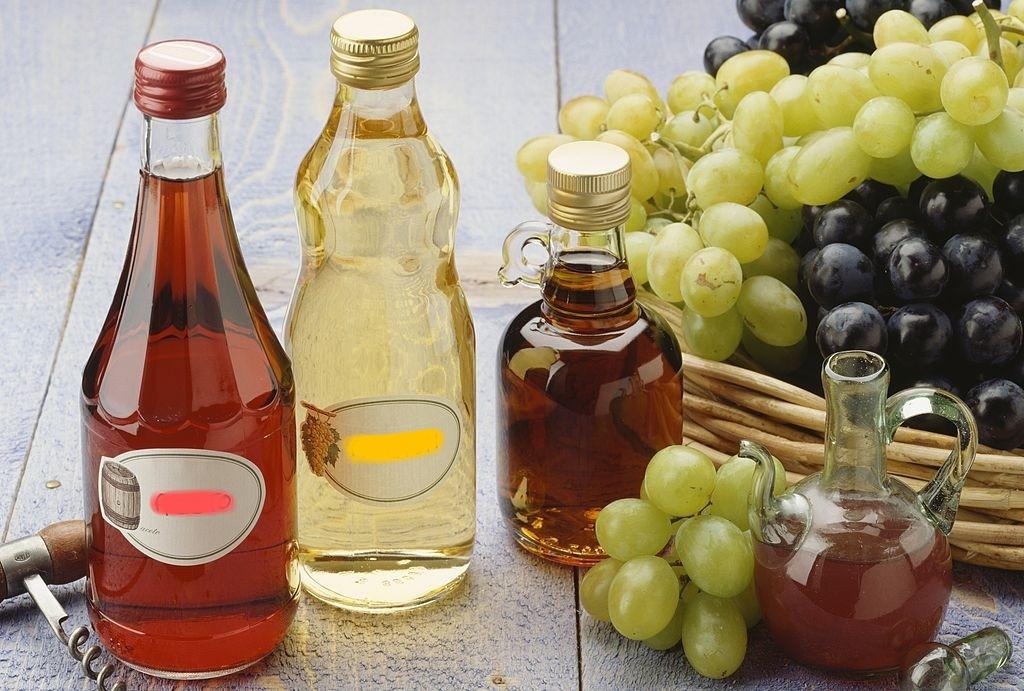Looking for a natural way to support your health? Vinegar might be the answer! Studies suggest that vinegar can help with a variety of things, including thinning the blood, breaking down fats, and eliminating toxins. It may also contribute to lower blood lipid levels. Additionally, the citric acid in vinegar aids digestion and calcium absorption, while also playing a role in metabolism.
How to Make Grape Vinegar
If you make vinegar with yellow or green grapes, the vinegar will be white, and if you make it with red grapes, the vinegar will be red. The sweeter the grapes, the better the quality of the vinegar will be. You can start making vinegar in early autumn.
First, wash the grapes thoroughly, remove the stems, and mash them a little. You can use a food processor or blender.
Note: The grapes should not be exposed to light, so do not use a transparent container for homemade vinegar. If you have to use a transparent container, be sure to cover it with black plastic.
Depending on the sweetness of the grapes, you should add some water to the container.
For each kilogram of sweet grapes, add 150 to 200 grams of water.
The amount of water depends on the sweetness of the grapes; the sweeter they are, the more water you should add.
When the grapes are mixed with water, reactions occur that cause foam to form on the surface.
Therefore, leave some space at the top of the container to prevent overflow.
Do not seal the container tightly; cover it in a way that allows air circulation, as the fermentation process requires air.
After four to five days, when the grapes are changing shape and rotting, vinegar flies will appear around the container. These flies are essential in the fermentation and production of vinegar. The best temperature for these insects is 25 degrees Celsius.
If the temperature drops below 25° C, the reproduction rate of these insects decreases.
Below 16° C, the flies die.
If the temperature rises above 30 ° C, it causes the male insects to become sterile and eventually die off.
After about a week, fermenting grapes will begin to bubble and rise to the surface. To ensure that the grapes on the surface fully decompose, stir them occasionally. In moderate weather conditions, after approximately a month, the grapes will be completely mashed and soft, gradually settling to the bottom of the container.
A liquid will form on the surface, creating foam and possibly mold.
The time required for fermentation can vary depending on the temperature.
In this case, if the grape juice is rich and thick, mold does not form at all. If the sediment and mold on the surface of the liquid are white in color, it indicates a low nutrient content and thin consistency.
It's recommended to repeat the fermentation process two to three times.
If the color is creamy brown, the mixture is appropriate for vinegar production.
If the grape juice is rich and thick, it will taste bitter.
To make it sour and produce vinegar, you need to add some water to the mixture and stir it well.
If the grape juice is low in richness and thin, you can improve it by adding more sweet grapes and allowing it to sit until it reaches the desired consistency.
Alternatively, let it evaporate until it is suitable for vinegar production. After about 50 to 70 days, separate the grape pulp from the liquid.

Pour the liquid into glass containers and do not seal them tightly.
In the second stage of making homemade grape vinegar, let the liquid ferment completely and turn into vinegar.
The grape pulp, once separated from the liquid, should be pressed to extract any remaining juice.
You can place the pulp in a mesh cloth and squeeze it to separate the juice. Discard the final grape pulp and add the extracted juice to the previous liquid. The pulp can also be used as animal feed.
After about a week from the second stage, you will notice a sediment resembling mud settling at the bottom of the glass container. This sediment needs to be separated from the vinegar.
To do this, transfer the vinegar to another container, leaving the sediment behind. Discard the sediment.
Repeat this process one or two more times until the liquid becomes clear.
Pour the vinegar preferably into glass containers and store them in shade.
Note: Some people use salt, bread dough, and other yeasts in vinegar production, which is not recommended.
Can vinegar flies tell you if vinegar's gone bad?
No, these are not regular flies. They are small flies called Drosophila that hover around the container when alcohol is turning into vinegar, consuming some of the vinegar. Their presence actually indicates vinegar formation and does not pose any taste or health issues for your product.
Health Benefits of Grape Vinegar
Nature: Grape vinegar has a cold and dry temperament.
Composition: Grape vinegar contains minerals and various vitamins.
Caloric Content: Each cup of grape vinegar provides 33 calories of energy.
Digestive Aid: Vinegar significantly aids in digestion.
Oral and Dental Health: It helps in dental plaque removal, reduces gum inflammation, eliminates bad breath, and promotes teeth whitening.
Skin Care: Effective in controlling blackheads, removing dead skin cells, and managing dry skin.
Hair Care: Acts as a hair cleanser and helps in dandruff removal.
Various Treatments: Used in treating body odor, foot fungus, athlete's foot and swelling in feet.
Antimicrobial Properties: Grape vinegar is a potent antimicrobial agent.
Liver Health: It supports liver detoxification and reduces bile secretion.
Diabetes Management: Beneficial for individuals with type 2 diabetes.
Cardiovascular Health: Dilutes blood, breaks down fats, and aids in toxin elimination.
Weight Management: Prevents fat accumulation in the body, contributing to weight reduction.

Hazards of Grape Vinegar
Regular consumption of vinegar can indeed pose risks for some individuals.
Vinegar may cause throat and stomach irritation.
It can potentially damage tooth enamel.
Individuals with nerve weakness, joint pain, or stomach ulcers should avoid vinegar due to its acidic nature.
People with lung diseases and dry coughs should refrain from consuming vinegar.
Vinegar may interact with certain medications, so consulting a doctor before regular and excessive consumption is advisable.
Vinegar reduces sexual potency and is harmful to those with a cold temperament.
It disturbs the nerves. Those who prefer calmness should avoid vinegar.
Persistent consumption of vinegar reduces visual acuity.
Continuous use of vinegar can cause yellowing of the skin and weight loss.
Inhalation of grape vinegar vapor is effective in relieving nasal congestion due to colds.
Grape vinegar vapor is also effective in relieving sore throats.
Click here to read more about vinegars and their benefits.
External Sources
We hope you found this guide on grape vinegar helpful! Please leave a review and let us know your thoughts or share your own experiences with making and using vinegar. Your feedback is greatly appreciated!



